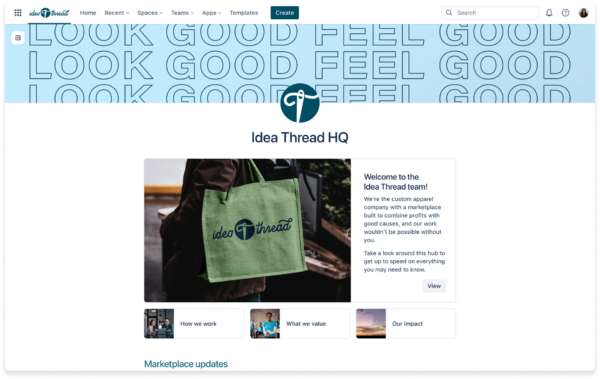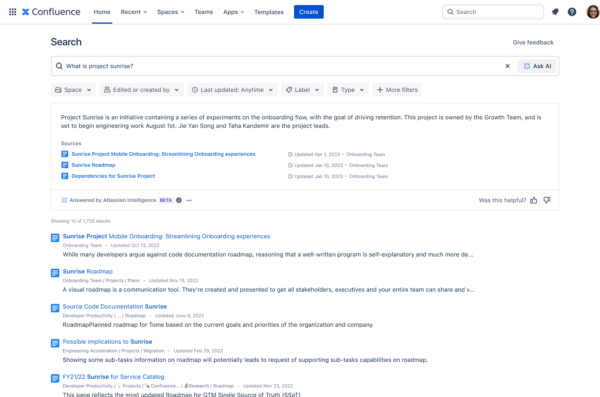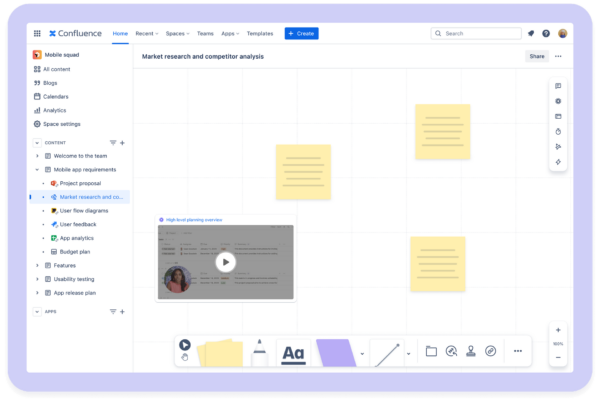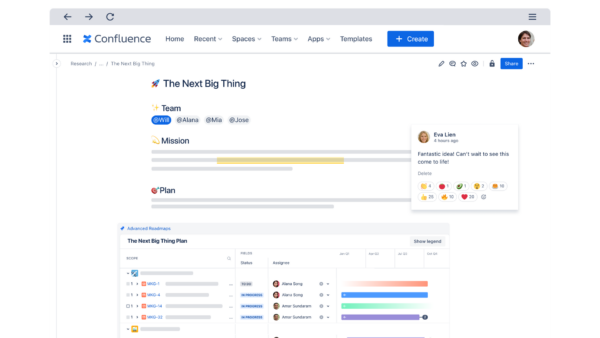The best projects are powered by knowledge
Learn why knowledge management is the key to efficient, effective project management
Project management is integral to business initiatives, consistently commanding attention and resources. Leaders invest in timelines, OKRs, and milestones to keep projects moving forward. But a critical factor is frequently overlooked: ensuring teams have the information they need to make those projects successful.
Without organization-wide alignment and quick access to accurate information, projects can easily go off track. Teams find themselves caught in the cycle of ‘work around work’ — revisiting tasks, hunting down updates, or sitting through endless meetings that drain hours but offer little clarity.
The reality is that effective project management is impossible without solid knowledge management. For leaders managing multiple teams and tools, a connected knowledge base is essential. It’s the key to breaking down silos, boosting collaboration, and ensuring projects move forward without costly delays.
The Achilles’ heel of project management
Project management is designed to turn strategies into results, but success depends on teams having the right knowledge. Gartner reports that 47% of digital workers can’t find the information they need to work efficiently, and 32% have “made the wrong decision due to lack of awareness.” These knowledge gaps introduce significant vulnerabilities, like wasting resources on redundant tasks or missing deadlines that slow progress.
Everyone is so eager to map out project timelines, deliverables, phases, and OKRs. But at the start of any project, teams need relevant details to set a clear course. They should be able to answer essential questions like:
- Does this project support our top priorities?
- Has another team done similar work that could simplify our efforts?
- Do we have the full context to make this project successful?
Without access to up-to-date information, answering these questions becomes difficult. And without the right answers, teams veer off course. One department might redo work another has already finished, or move forward without considering dependencies, causing bottlenecks.
As organizations scale, these challenges only grow. Poor knowledge management can set off a domino effect, leading to inconsistent project execution and preventing teams from achieving strategic goals. Picture this: A multinational company launches a product but fails to align regional teams on updated specs. The result? The company delivers mismatched messaging, frustrates customers, and loses market opportunities — all due to lack of effective knowledge sharing.
The knowledge management solution
If project management is the engine that powers work forward, then knowledge management is its fuel.
Knowledge management — the process of creating, curating, and sharing information across the organization — connects teams and tools so everyone has the details they need, when they need them.
This includes information on how work relates to your company’s overall strategy, how it intersects with others’ work, and how it utilizes existing resources.
Effective knowledge management supports both high-level strategy and daily execution. Here’s how alignment can impact an organization at both levels:
- Strategic level: Imagine your customer support and product teams both launch strategic initiatives to improve customer communication. Without a knowledge-sharing system, they may duplicate efforts, leading to mixed messages for customers and wasted resources. But with a centralized knowledge hub, teams can align on goals, share insights, and build on each other’s work — creating a scalable process that improves cohesion across the organization.
- Execution level: Now consider a project lead who leaves unexpectedly, taking their notes and key project details with them. Without a shared knowledge system, the remaining team is left scrambling to locate files or recreate missing information. This slows progress and puts goals at risk. But with a connected knowledge system, all files and decisions are stored in one place, so the team can continue to work seamlessly without delay.
By embedding knowledge management into your project management practices, teams can make faster decisions, maximize resources, and avoid unnecessary setbacks. A central knowledge hub ensures that files are easy to find, insights are clear, and work flows smoothly.

No more surprises, like, “Actually, that product won’t launch for another six months.” Or, “the budget was reprioritized for that initiative.” The information is all there in one place for optimal collaboration and productivity.
Getting knowledge management right
The benefits of knowledge management are clear, but an effective system goes beyond simply storing policies and procedures. Many companies rely on static systems, like wikis, that hold only basic information that are looked at once in a while. But a truly effective knowledge management system is dynamic — it empowers teams to collaborate, create, and share insights seamlessly every day.
To enable this, knowledge sharing must center on three key principles:
Knowledge is discoverable
Teams can’t use information they can’t find. For knowledge to support project collaboration, it must be easy to locate. A good knowledge management system empowers teams to search with confidence, ensuring that nothing important is hidden away in personal files or scattered across different tools. Instead, all critical information is centralized and instantly accessible.
Imagine a team kicking off a new project. With a dynamic knowledge management system, teams can search relevant keywords and immediately find documents, decisions, and past discussions, no matter where they’re stored. This access minimizes time spent tracking down information and guarantees teams work with the most current insights. The best systems even suggest helpful resources based on the team’s ongoing projects, surfacing valuable information they might not have thought to look for.
Unlike SharePoint or Google Workspace, a dynamic system combines content creation, organization, and sharing into a powerful, searchable knowledge engine. It retrieves information when you need it and smartly suggests it when you don’t. By making critical knowledge accessible, organizations align their teams and empower them to act independently.
See it in practice: Atlassian enables seamless real-time collaboration through cross-tool integration. Teams can search across Atlassian products like Confluence and Jira, as well as third-party tools like Google Drive, SharePoint, and Figma, so all relevant information is readily available to support their work.

Knowledge is flexible
Once knowledge is easily discoverable, teams can use it as a foundation to develop and expand ideas. Today’s knowledge takes many forms — brainstorming notes, meeting summaries, whiteboard sketches, and video discussions. An effective knowledge management system captures this diversity in real time, transforming it into insights that are usable and adaptable as projects evolve.
Imagine a company-wide initiative to develop a new service offering. With a work management system that supports flexible knowledge creation, each team works in the medium that fits their needs. First, the strategy team sketches out high-level ideas on a shared digital whiteboard. As plans take shape, the product and project management teams convert whiteboard notes into structured action plans and build detailed project timelines. Later, the user research team holds video meetings to discuss feedback from early testing, recording and storing each session for easy reference.
This adaptability allows each team to work in their preferred format while ensuring all insights are connected and easy to update. As projects progress, knowledge remains relevant, available, and actionable at every stage, minimizing the need for duplicate efforts and creating a seamless workflow from start to finish.
See it in practice: Atlassian supports the journey from idea to action with tools like Confluence’s whiteboards for brainstorming, ready-made templates for project planning, and Loom integration for searchable video discussions. By capturing knowledge in various formats, teams stay seamlessly connected across Atlassian and third-party tools.

Knowledge is actionable
Flexible, accessible knowledge turns passive information into a collaborative resource that teams can refine, build upon, and share — creating a living asset that grows with each contribution. This engagement brings alignment across the organization, connecting leadership with frontline teams and ensuring everyone works toward the same goals.
Imagine a program focused on improving customer experience across all touchpoints. A project of this scale calls for seamless collaboration between departments like customer support, product development, and marketing. With an actionable knowledge system, each team can easily share insights, tag colleagues for input, and post updates in a central hub. This level of visibility facilitates faster data-driven decisions and consistent messaging.
An effective knowledge management system also integrates social features that encourage collaboration. Tools like commenting, tagging, and feedback metrics invite participation and build accountability. Managers can even track who has reviewed materials before key meetings so discussions stay productive and focused on progress.
See it in practice: With Atlassian tools, teams can connect knowledge in Confluence to project plans in Jira using Atlassian Intelligence, making it easy to assign owners and steps instantly. AI tools and integrations transform insights into clear actions, ensuring every team member knows their next move.

Empower your projects with knowledge
The difference between a good project and a transformative one is the foundation it’s built on. Project management keeps tasks on track, but accessible, actionable knowledge is what ensures teams stay aligned and responsive.
With Confluence, knowledge doesn’t sit in silos. All resources and insights flow through one workspace, making it easy for teams to find what they need, collaborate in real time, and make faster data-driven decisions. When everyone’s connected, work moves faster, resources go further, and outcomes are stronger.
Ready to make knowledge your organization’s greatest asset? Explore Confluence to empower your teams to work smarter, adapt quickly, and gain the competitive edge that drives results.

